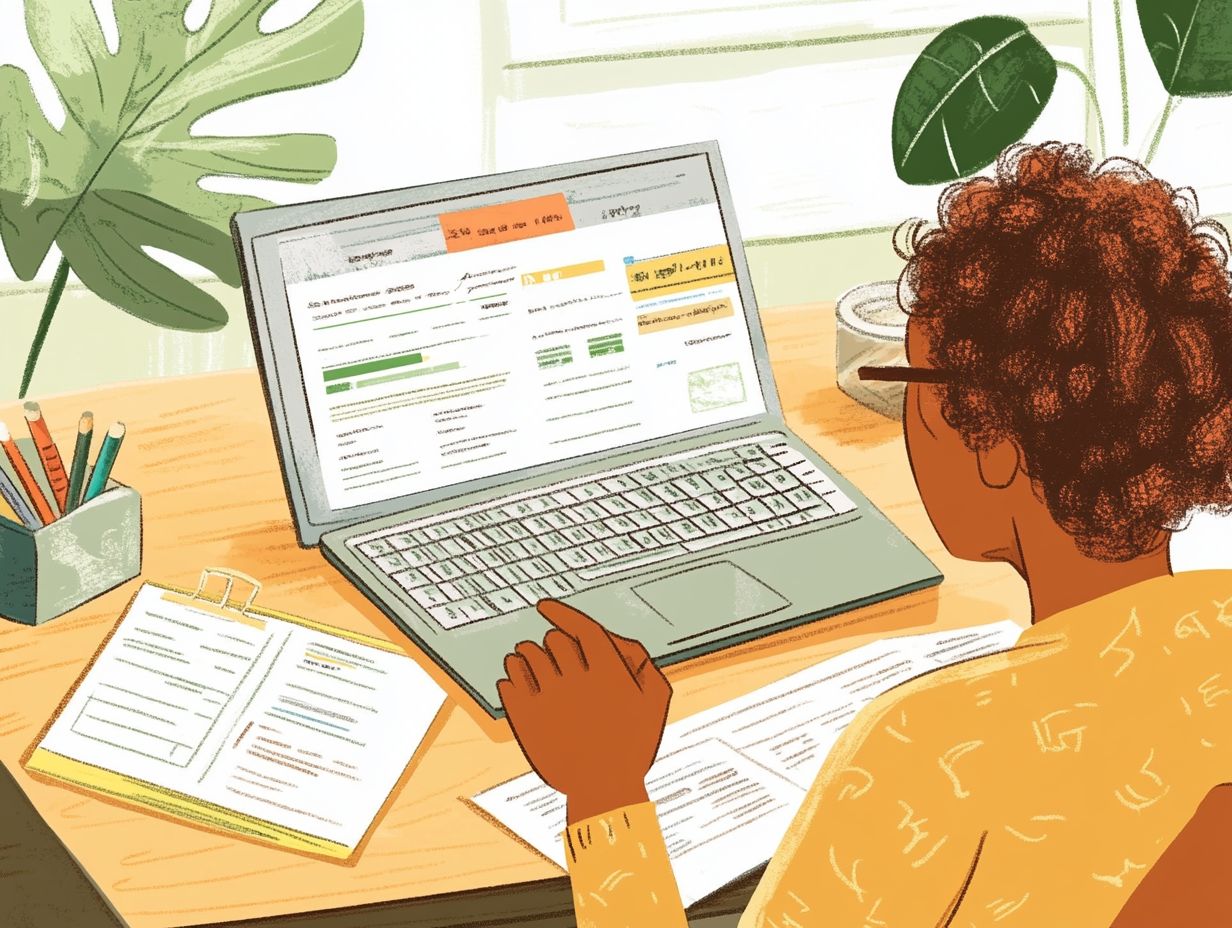10 Steps to Take After a Credit Score Drop
Experiencing a drop in your credit score can be quite alarming, but rest assured, it s not the end of the world. Let s dive in and take charge of your credit today!
By understanding the reasons behind this decline and knowing the steps to take, you can regain control of your financial health. This guide offers 15 practical strategies designed to help you recover from a dip in your credit score.
From pinpointing the cause to maintaining a positive credit history, you ll find a comprehensive walkthrough of each step necessary to restore your creditworthiness. Start applying these strategies now to boost your credit score!
Contents
- Key Takeaways:
- 1. Determine the Cause of the Drop
- 2. Check for Errors on Your Credit Report
- 3. Create a Budget and Stick to It
- 4. Prioritize Your Debts
- 5. Communicate with Creditors
- 6. Consider Credit Counseling
- 7. Look into Debt Consolidation
- 8. Avoid Taking on New Debt
- 9. Improve Your Payment History
- 10. Increase Your Credit Limit
- 11. Make On-Time Payments
- 12. Keep Credit Card Balances Low
- 13. Don’t Close Old Credit Accounts
- 14. Be Patient and Persistent
- 15. Monitor Your Credit Score Regularly
- What Are the Common Reasons for a Credit Score Drop?
- Frequently Asked Questions
- What Are the Main Steps to Take After a Credit Score Drop?
- How Do I Review My Credit Report After a Credit Score Drop?
- What Should I Do If I Identify the Cause of My Credit Score Drop?
- How Can I Dispute Errors on My Credit Report?
- Is It Important to Reduce My Credit Utilization After a Credit Score Drop?
- Should I Refrain from Applying for New Credit After a Credit Score Drop?
Key Takeaways:

- Determine the cause of your credit score drop and address it immediately to prevent further damage.
- Regularly monitor your credit report for errors and dispute any inaccuracies to boost your score.
- Create a budget and stick to it, prioritize debts, and communicate with creditors to improve your financial situation and credit score.
1. Determine the Cause of the Drop
A drop in your credit score can seriously impact your ability to secure loans, particularly mortgage loans, so understanding the root causes is vital for effective credit management.
Common culprits include negative entries on your credit report, like late payments or high credit utilization ratios, which can directly influence your FICO scores and overall financial well-being.
Your payment history is especially critical. Consistently missing payments can send a red flag to lenders, marking you as a higher risk and negatively affecting your score.
Credit utilization is also crucial. It refers to the amount of credit you re using compared to your total credit limit, and it’s generally wise to keep this ratio below 30%.
To identify and evaluate these contributing factors, you should regularly review your credit report. This practice allows you to spot inaccuracies, understand patterns in your financial behavior, and take the necessary steps to enhance your score.
2. Check for Errors on Your Credit Report
Checking for errors on your credit report is a crucial step in maintaining a healthy credit score. Inaccuracies can lead to wrongly low credit scores, which may hinder your ability to borrow money.
These errors might include incorrect outstanding debt amounts or discrepancies in payment history reported by credit bureaus like Experian, Equifax, and TransUnion.
You can get your credit report for free once a year from AnnualCreditReport.com, a valuable resource designed to help you stay informed about your financial standing.
This site allows you to access reports from all three major credit bureaus, giving you the opportunity for a comprehensive review to catch any discrepancies.
If you do discover errors, it s essential to dispute these inaccuracies promptly. Each bureau has a straightforward online process for filing disputes, usually requiring some supporting documentation.
By adopting a habit of regularly monitoring your credit report, you can prevent surprises down the road, fostering financial awareness and better management of your credit profile.
3. Create a Budget and Stick to It
Creating a budget is crucial for effectively managing your finances, especially when you’re navigating outstanding debt or striving to enhance your credit score over time.
A well-structured budgeting plan allows you to allocate funds for essential expenses while ensuring timely payments towards your debts. This ultimately boosts your overall financial stability.
Utilizing strategies like the debt avalanche or debt snowball techniques can simplify your repayment process. The debt avalanche method emphasizes paying off high-interest debts first, saving you money in the long run.
On the other hand, the debt snowball approach focuses on tackling smaller debts, offering a psychological boost as you eliminate them quickly.
By maintaining a disciplined budgeting system, you can stay on top of your scheduled payments and gradually improve your credit score.
Timely payments are a key factor creditors evaluate when assessing your creditworthiness. Ultimately, effective budgeting gives you the power to regain control over your financial situation and lays the groundwork for future financial growth.
4. Prioritize Your Debts
Prioritizing your debts is a smart strategy for managing your outstanding obligations. By tackling high-interest debts first, you can improve your credit usage and set yourself up for success.
Focusing on the debts that impact your credit score the most allows you to develop a more effective payment plan that strengthens your financial position. Methods like the debt avalanche and debt snowball can significantly streamline this journey.
The debt avalanche method encourages you to address high-interest debts first, minimizing the overall interest you ll pay. The debt snowball approach allows you to knock out smaller debts initially, providing early wins that can boost your motivation.
As you systematically reduce these debts, you’ll lower your total balance and positively influence your credit usage, leading to gradual improvements in your credit score. This deliberate strategy helps cultivate better financial habits, bringing you closer to the ultimate goal of financial freedom.
5. Communicate with Creditors
Effective communication with your creditors can shape your payment history and overall credit score, especially during financially tough times. By openly discussing your circumstances, you may find opportunities to negotiate a more manageable payment plan or defer payments, safeguarding your credit report from negative impacts.
To kick off these discussions, it s crucial to be proactive; don t wait for the creditor to reach out to you. Engaging with them and being transparent about your financial situation can cultivate trust and pave the way for negotiations.
Share accurate details about your income, expenses, and any temporary hardships to make a compelling case. This honesty could lead to favorable outcomes, like adjusted payment plans that align better with your budget, reduced interest rates, or even waivers for late fees.
These adjustments can ease your financial stress and help maintain your credit standing.
6. Consider Credit Counseling
Credit counseling offers vital guidance for anyone dealing with debt or wanting to refine their budgeting skills. It provides a structured path to effective financial management. Organizations like the National Foundation for Credit Counseling can help you craft personalized strategies designed to boost your credit score and enhance your overall financial wellbeing.
These organizations typically offer services like budgeting workshops, debt management plans, and financial education programs. By mastering budgeting, you may gain control over your expenses and savings, paving the way for improved debt management.
When seeking reputable credit counseling services, prioritize accredited organizations with a proven track record and positive reviews. With the right support, you can boost your financial knowledge and embark on a journey toward a healthier financial future, free from the burden of overwhelming debt.
7. Look into Debt Consolidation

Debt consolidation can serve as a powerful tool to manage your outstanding debt by merging multiple debts into a single payment plan. This strategy can lower your interest rates and improve your credit score over time.
Simplifying your financial obligations can make life easier and enhance your payment history when executed correctly. You can explore various methods, such as personal loans or balance transfer credit cards, to find a solution that fits your financial situation.
Personal loans allow you to make a lump sum payment to settle debts, typically with fixed interest rates. Balance transfer cards often come with promotional rates that can drastically reduce your interest costs.
When you manage these strategies carefully, they can streamline your payment process and positively impact your credit score. Reduced debts and improved payment behaviors reflect a commitment to responsible financial management. Understanding the right method for debt consolidation is essential for achieving long-term financial health.
Start your journey to financial freedom today reach out to a credit counselor!
8. Avoid Taking on New Debt
Avoiding new debt is essential for maintaining a healthy credit score, especially when you’re working to improve your payment history and manage your credit utilization effectively. Concentrate on managing your current debts rather than adding more.
Want to keep your credit score strong? Just one hard inquiry can cause your score to dip by a few points. While that may seem small, it can significantly influence lending decisions. Understanding this impact highlights the importance of keeping your credit utilization low; high balances relative to your credit limits can negatively affect your scores.
To resist the allure of new loans or credit cards, create a budget that prioritizes your existing obligations and outlines clear financial goals. Distinguishing between your needs and wants will empower you to make informed choices that foster your overall financial health.
9. Improve Your Payment History
Improving your payment history is one of the most effective ways to elevate your credit score, as it constitutes a significant portion of FICO scores. Timely payments on loans and credit cards are crucial for demonstrating your reliability to credit bureaus.
To ensure you consistently make timely bill payments, implement practical strategies. Set up automated payments for recurring bills to minimize the risk of forgetting due dates.
Utilize payment reminders through smartphone apps or calendars to keep your financial responsibilities in check. Creating a realistic budget allows you to allocate funds in advance for upcoming expenses, significantly reducing the likelihood of late payments.
By integrating these strategies into your routine, you can enhance your payment history and, ultimately, your creditworthiness.
10. Increase Your Credit Limit
Want to boost your credit score? Increasing your credit limit is a smart move! It can significantly enhance your credit utilization, a key factor in shaping your credit score, particularly for credit cards.
To request a credit limit increase, reach out to your credit card issuer directly either by phone or through their online portal. This process usually involves a review of your current financial situation, including your payment history and income.
A higher limit not only acts as a cushion for unexpected expenses but also enhances your credit profile when you maintain low balances. Keep your credit card balances below 30% of your available credit to foster a healthier score, signaling to lenders that you manage your borrowing responsibly.
11. Make On-Time Payments
Making on-time payments is crucial for maintaining a strong credit score, as it directly influences your payment history and showcases your reliability as a borrower. By consistently being punctual with your credit cards and other obligations, you cultivate a positive credit history.
Timely payments boost your creditworthiness and open doors to better interest rates and loan opportunities. To ensure you never miss a deadline, implement various strategies:
- Set reminders through mobile apps or calendars to keep your payments on track.
- Utilize automatic payments to settle your obligations promptly, minimizing the risk of late fees.
- Create a dedicated payment schedule to stay organized.
- Review your bills monthly to anticipate upcoming payments.
By weaving these practices into your daily routine, you can confidently maintain a healthy financial standing. Don’t wait! Set up those automated payments today to protect your credit.
12. Keep Credit Card Balances Low
Keeping your credit card balances low is essential for managing credit utilization, which is a key element in determining your credit score and overall financial health. Maintaining balances below 30% of your credit limit shows responsible credit management and positively impacts your FICO scores.
A low credit card balance reflects a reliable borrowing history and significantly influences how lenders view your creditworthiness. Making multiple small payments throughout the month instead of one large payment helps keep your balances manageable, thus lowering the amount of credit you use.
This proactive approach can shift lenders’ perceptions, making you appear more trustworthy and financially savvy. Over time, consistently low balances can lead to improved loan terms and interest rates, highlighting the importance of these habits in achieving your long-term financial goals.
13. Don’t Close Old Credit Accounts
Avoiding the closure of old credit accounts is essential for maintaining a positive credit history, which is a crucial factor in determining your credit score. Closing accounts can reduce your overall available credit and shorten your credit history, both of which can negatively impact your FICO scores.
By keeping those long-standing accounts open, you effectively demonstrate responsible credit management and enhance your credit utilization. A longer credit history illustrates your reliability and signals financial maturity, qualities that lenders appreciate.
There are situations where closing accounts might benefit you, especially if you’re dealing with high fees or subpar service. In those instances, weigh the potential drop in your score against the immediate benefits you might gain.
Finding the right balance is key to your financial success! Maintaining beneficial accounts can lead to a healthier financial profile, while sometimes eliminating detrimental ones becomes a necessary move.
14. Be Patient and Persistent

Being patient and persistent in your quest to enhance your credit score is essential, as significant changes often take time to appear in your FICO scores. While immediate fixes may not always be possible, your consistent efforts in managing debts and payments can gradually lead to a more favorable credit profile.
This journey typically unfolds over several months or even years as you work to understand your credit report, dispute inaccuracies, and cultivate healthier financial habits. Pay your bills on time and keep your credit utilization below 30% to collectively boost your credit standing.
It may help to establish an emergency fund to navigate unexpected expenses without relying on credit, showcasing your responsible financial management.
By intertwining these long-term strategies with unwavering commitment, you can watch your scores improve steadily, paving the way for greater financial opportunities in the future.
15. Monitor Your Credit Score Regularly
Regularly monitoring your credit score is essential for staying informed about your financial health and understanding how different factors impact your creditworthiness. Using resources from Experian, Equifax, and TransUnion enables you to track your credit report and pinpoint areas for improvement.
By keeping a watchful eye on your credit score, you can catch inaccuracies or signs of fraudulent activity early on, potentially saving yourself from future financial troubles. Accessing free credit reports at AnnualCreditReport.com allows you to review your credit history at no cost, ensuring you remain fully aware of your current standing.
There are various tools and apps available to help you track changes over time, providing valuable insights into your spending habits and payment patterns. Understanding the nuances of credit scores like how payment history or the amount of credit you use affects your score is crucial, giving you the power to make informed decisions that positively influence your financial journey.
Don t wait until it s too late monitor your credit score regularly!
What Are the Common Reasons for a Credit Score Drop?
Understanding the common reasons for a credit score drop is essential. Many factors can contribute to this decline, and knowing how to handle a low credit score can make a significant difference.
Most notably, your payment history and the amount of credit you use compared to your total credit limit carry significant weight. Bad marks on your credit report can also sharply impact your FICO scores.
Take late payments, for example. A single missed payment could slash your credit score by as much as 100 points, according to credit scoring models. It s a harsh reality that can catch you off guard.
Experts recommend keeping your credit utilization below 30%. Exceeding this threshold may raise red flags for lenders, signaling increased risk.
Other troubling factors include applying for too much credit in a short span or having accounts that end up in collections.
To mitigate these impacts, consider these strategies:
- Set up automatic payments to ensure you never miss a due date.
- Regularly review your credit reports for errors every detail counts.
- Develop a strategy to pay down your existing debt while resisting the urge to open new credit accounts.
How Long Does It Take to Improve a Credit Score?
Improving your credit score can vary significantly in how long it takes. Several factors influence this, including the severity of negative information and the effectiveness of the strategies you employ.
Typically, you can expect to see noticeable improvements within three to six months if you commit to consistent effort and prudent financial practices.
For those facing more serious issues, such as bankruptcy or a history of late payments, it may take a year or more to achieve a significant uptick.
Conversely, maintaining low balances on your credit cards and making payments on time can help you experience faster progress.
Employing strategies like disputing inaccuracies on your credit reports or becoming an authorized user on a responsible account can also shorten the time it takes to see visible improvements.
By actively monitoring your credit and being mindful of your spending habits, you can strategically position yourself for quicker recovery in your credit score.
What Are the Long-Term Effects of a Credit Score Drop?
The long-term effects of a credit score drop can be quite significant. This situation could seriously limit your access to credit cards, mortgages, and car loans.
A lower credit score sends a signal to lenders that you may be a higher risk. This can lead to reduced borrowing limits and higher interest rates on future loans, drastically reshaping your financial landscape.
Over time, the inability to secure favorable loan terms can stifle your opportunities for significant investments, such as a home or education, both of which are crucial for long-term financial stability.
To recover your score, regularly check your credit reports for mistakes, ensure your bills are paid on time, and keep your credit card balances low.
Stay responsible with your credit habits to rebuild your score. This will help you secure better interest rates and loans.
How Can One Maintain a Good Credit Score?
Maintaining a solid credit score is crucial for securing favorable loan terms and interest rates. It demands your consistent attention in managing payment history and budgeting.
Key strategies to keep in mind include:
- Keeping your credit utilization low
- Making timely payments
- Regularly monitoring your credit report for any discrepancies
A well-structured budget can change how you spend and help you pay off debts effectively. It s wise to plan your monthly expenses and allocate specific funds for those debt payments. This helps you avoid late fees and missed deadlines that could negatively impact your credit score.
Using automatic payment options is a smart move to ensure your bills are paid on time. This further enhances your credit health. Regularly checking your credit reports not only helps you spot errors or unauthorized accounts but also allows you to track your progress.
It s essential to steer clear of common pitfalls, like taking on excessive debt or maxing out credit cards. By maintaining discipline around your spending and prioritizing savings, you can significantly bolster your overall financial wellness.
What Are the Benefits of Having a Good Credit Score?
Having a good credit score comes with a wealth of advantages that can truly elevate your financial situation. Picture this: lower interest rates on loans and credit products, increased borrowing limits, and more favorable terms on mortgage loans. All of this works together to enhance your financial stability.
A solid credit score not only helps you save on interest payments but also opens up a world of lending opportunities.
For example, individuals with higher credit scores often enjoy discounts on insurance premiums, as insurers view them as lower-risk clients. In terms of renting an apartment, a strong credit record can significantly boost your chances of landing that dream lease. Landlords typically rely on credit histories to gauge a tenant’s reliability.
This advantageous financial standing gives you extra leverage in negotiations, potentially leading to better contracts and terms that contribute to long-term financial health.
Frequently Asked Questions

What Are the Main Steps to Take After a Credit Score Drop?
The 10 main steps are:
- Review your credit report
- Identify the cause of the drop
- Contact creditors
- Pay off outstanding balances
- Dispute errors
- Reduce the amount of credit you use compared to your limit
- Refrain from applying for new credit
- Create a budget
- Seek credit counseling
- Wait for the effects to subside
How Do I Review My Credit Report After a Credit Score Drop?
You can obtain a free copy of your credit report from each of the three major credit bureaus once a year. Review each report for any errors or discrepancies that may be causing your score to drop. For tips on improving your score, consider following these 5 steps to rebuild your credit for future applications. Look for any missed or late payments, high credit card balances, or accounts that you do not recognize.
What Should I Do If I Identify the Cause of My Credit Score Drop?
If you identify the cause of your credit score drop, such as a missed payment or high credit card balance, take action to address it immediately. 10 tips to boost your credit score can help you navigate this process effectively. Contact your creditor to try to negotiate a payment plan or a reduced interest rate. Pay off any outstanding balances as soon as possible to improve your credit score.
How Can I Dispute Errors on My Credit Report?
If you find any errors or discrepancies on your credit report, you have the right to dispute them. Contact the credit bureau that provided the report and provide evidence to support your dispute. The credit bureau will investigate and make any necessary corrections to your report.
Is It Important to Reduce My Credit Utilization After a Credit Score Drop?
Yes, reducing your credit utilization is crucial after a credit score drop. The lower your credit utilization, the better for your credit score. To effectively manage your credit, consider following the 5 best practices for credit score maintenance and aim to keep it below 30% to see an improvement in your score.
Taking charge of your credit score can open doors to great financial opportunities!
Should I Refrain from Applying for New Credit After a Credit Score Drop?
Yes, it’s best to hold off on applying for new credit after your score drops. When you apply, lenders check your credit, which can lower your score further. For more insights, check out this guide on how to approach credit score improvement.
Instead, focus on improving your credit score first. This way, you’ll have a better chance of getting approved and can secure more favorable terms.






